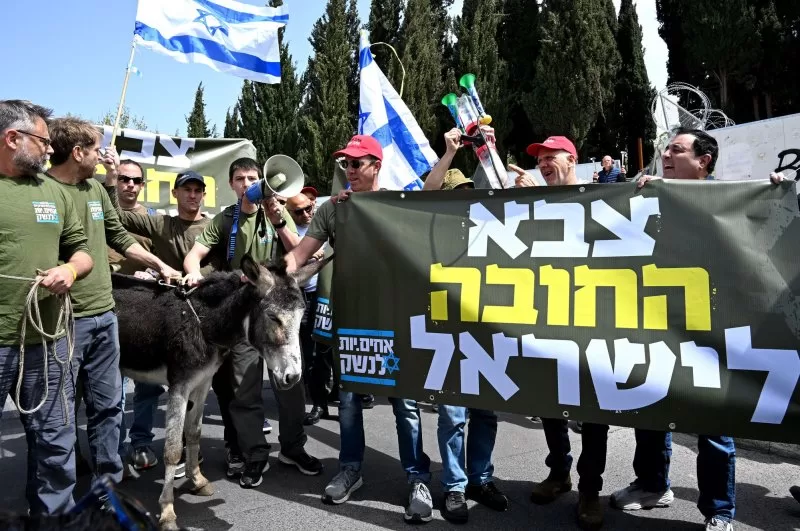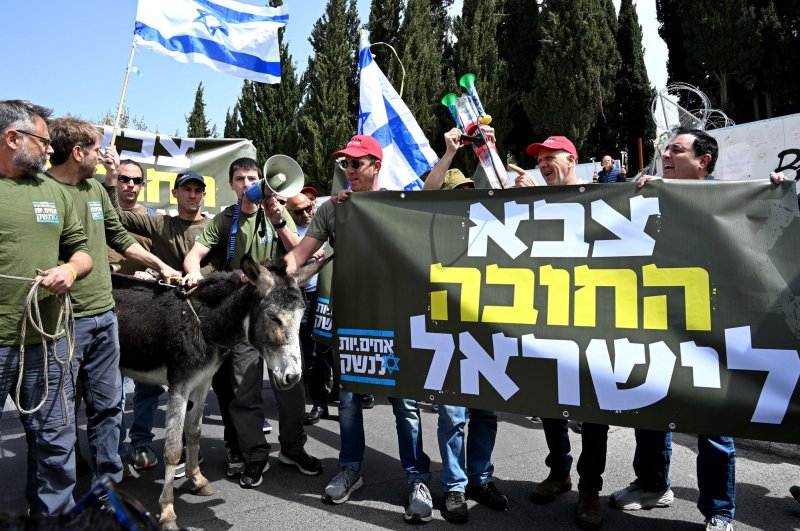Israeli army reserve activists protest against military exemption for the ultra-Orthodox Haredi outside Prime Minister Benjamin Netanyahu’s office. The High Court on Thursday ordered a freeze to government funding to Haredi religious schools, which have served as a legal framework exempting students from military service. Photo by Debbie Hill/ UPI |
License PhotoMarch 29 (UPI) — Israel’s High Court of Justice on Thursday issued a freeze on funding for ultra-Orthodox educational institutions, effectively making their students eligible for military service.
Members of Israel’s ultra-Orthodox Haredi Jewish community traditionally have received exemptions from the country’s mandatory military service if they are studying full-time in a religious seminary or yeshiva.
Thursday’s decision to halt government funding to these institutions, however, means the legal framework that kept eligible students exempt from military duty no longer exists, potentially affecting about 50,000 yeshiva students.
The decision also comes after a government resolution from June 2023 ordering the IDF to temporarily halt conscription of Haredi students was set to expire at midnight Sunday.
The order is set to go into effect April 1. At that time, some institutions will already have their funds cut, but a larger-scale enforcement won’t take effect until Aug. 9, implying the government has time to bypass the decision.
Haredi exemptions from service have been widely unpopular among the Israeli public. Conscription into the Israel Defense Force is mandatory for almost all other Israeli citizens, except for those of Arab descent, from the age of 18.
The government is currently debating a compromise bill that would allow exemptions with limitations, but the debate could threaten to throw Israeli Prime Minister Benjamin Netanyahu‘s party into chaos.
The United Torah Judaism and Shas Haredi parties blasted the court’s decision, with UTJ head Yitzhak Goldknopf saying it constitutes “severe harm to those who toil in Torah” and is “a stain and a disgrace.”
Shas party head Aryeh Deri accused the court of “leading a harmful approach against Torah students, upon whom the world stands.”
“Shas will continue to fight for yeshiva students’ right to persevere in Torah and will consider its next steps,” Deri said.
Benny Gantz, leader of the secular National Union party, opposed the proposal for opposite reasons, insisting exemptions be done away with entirely.
“The people will not tolerate it, the Knesset will not be able to vote in favor of it, and my associates and I cannot be part of this emergency government if this law passes,” he said Monday.
The Movement for Quality of Government in Israel, whose petition against the government led to Thursday’s decision, called it “a historic interim order this evening, marking the end of unlawful discrimination in the draft.”
“No more support for those who do not share the burden. This interim order is a precedent-setting step on the road to equality, and those who serve thank the court for its important decision.”
Netanyahu earlier Thursday wrote a letter to the High Court asking for an extra 30 days by which he hoped to reach a compromise with the Haredi parties.
The prime minister argued that while the government had initially given itself nine months to present a new bill to the court, the Oct. 7 Hamas attack has thrown off the deliberation process.
Yair Lapid, leader of the opposition Yesh Atid party, responded to Netanyahu’s letter in a statement, saying, “The only thing that Netanyahu dealt with during the last few days was to seek a blanket exemption from enlistment for Haredim that will ensure the stability of his coalition.”
Labor party member Gilad Kariv also dug into Netanyahu in a post on X, saying, “After six months of war, Netanyahu’s response is not just a slap in the faces of the mandatory and reserve soldiers, but a total abandonment of Israeli security.

